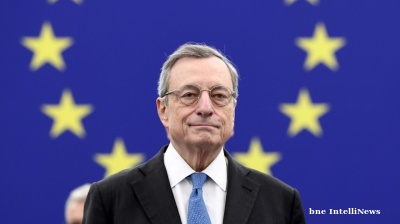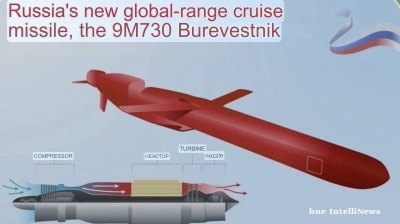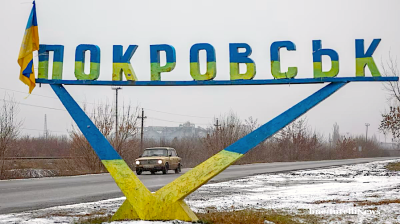Is the Kursk incursion by the Armed Forces of Ukraine (AFU) a big strategic blunder? Following the spectacular and rapid capture of over 90 settlements and more than 1,000 square kilometres of territory since August 6, military experts worry about the deteriorating position of Ukraine's defence of the front line in Donbas.
The incursion has been a great PR success, reversing the narrative from the defeatist growing Ukraine fatigue back to the heroic Ukrainian David and his slingshot taking the fight into the Russian Goliath’s homeland for the first time since the Nazi invasion of 1939.
But the lingering question of what the military goal of the operation is remains unanswered and in recent weeks the Armed Forces of Russia (AFR) have been making steady progress against Ukraine’s defence, which appears to be crumbling under the onslaught.
What’s the goal?
As bne IntelliNews reported in the first days of the operation, analysts have been asking: why? Bankova’s military goal in the Kursk incursion remains obscure.
While there is no doubt that the assault has been a spectacular success and delivered a badly needed morale boost for Ukraine’s long-suffering population and the embattled AFU, the military advantage that comes from occupying Kursk is less obvious.
The main possible goals were listed as including:
· Slow or kill Russian momentum in its offensives which have lasted for the duration of 2024;
· to shift the narrative on the war to one more positive for Ukraine and counter Russian misinformation about their ‘inevitable victory’ in Ukraine;
· to capture a key gas substation at Sudzha that supplies Europe with Russian gas that is still operational;
· boost morale in the Ukrainian population after eight months of largely defensive operations and retreats; and
· grab as much territory as possible in case Ukraine is forced into some kind of negotiated settlement at the end of 2024.
Boost morale: if the goal was to change the narrative and boost morale, then the incursion has been a big success. According to reports from inside Kursk in Ukrainian occupied territory, the soldiers sound ebullient, happy to be on the move again and bringing the fight to Russia on its home turf.
Capture Sudzha: this part of the operation has also been successful, as the key gas metering station is now in Ukrainian hands. Kyiv always had the option of being able to end gas transit from Russia via Ukraine to Europe by simply blowing up the pipeline up, but now it can turn it off and still possess the option of turning it on again, which gives Bankova significant leverage over Hungary in particular, which has blocked many of the EU aid packages for Ukraine. Why Sudzha had to be captured is because it is not enough to be able to turn the gas off; it is necessary to control the place where the amount of gas flowing through the pipeline is measured, at the Sudzha metering station, as if the volume is not known then you can’t work out how much customers should pay, explains Serhiy Makogon, former director of the Ukrainian Gas Transmission System Operator (GTSOU).
Weaken Donbas: if the hope was to get the Kremlin to withdraw forces from the frontline in Donbas then that has failed. Russia has formed a new battle group to counter the incursion in the three regions on Ukraine’s border of Bryansk, Belgorod and Kursk, but it has drawn on reservists in these regions, and brought some from outside, from Kaliningrad for example, but has not withdrawn more than a few units from Donbas.
Ceasefire talks and Territory card: It is one thing to take Kursk. It is another thing entirely to keep it. Ukrainian President Volodymyr Zelenskiy has called for a second peace summit in November to which Russia and China will be invited, as neither turned up to the failed Swiss peace summit held on June 16-17. Many analysts have suggested that Bankova was hoping to hang on to Kursk to gain a territorial card that could be swapped for some of the territory annexed or occupied by Russia. This view was then corroborated by senior presidential advisor Mykhailo Podolyak in an interview with Newsweek. But Russian Foreign Minister Sergei Lavrov has already taken that card off the table, saying there will be no ceasefire negotiations with Kyiv as long as the AFU is in Kursk this week.
As bne IntelliNews reported, Ukraine was inching towards a ceasefire deal and a rare opportunity to end hostilities, but the Kremlin’s reaction to the Kursk incursion has killed that chance off.
Donbas is highly urbanised with nearly 7mn residents and forms a critical strategic link to the Crimea as well as granting Russia control over the Sea of Azov. The Kursk region is sparkly populated with a total population of 400,000 people, half of which have now left, and has no strategic military significance for the war in Ukraine. If Bankova intends to use Kursk as a bargaining chip it would be compelled to commit forces to the Kursk front indefinitely, and hold it to the bitter end.
However, it may not be necessary for Zelenskiy and Putin to meet. Senior sources told Politico on August 24 that Kyiv is hoping to do a deal with Russia on the same basis as the 2022 Black Sea Grain Initiative, where both Russia and Ukraine negotiated and signed deals with multilateral partners but not each other. The deal was brokered by Turkey and overseen by the UN.
The hope in Kyiv is that a similar ceasefire deal can be agreed this year using the same format, the sources told Politico.
This format is not impossible, especially if Russian forces take control of the key town of Pokrovsk, the key transport hub for the entire central and southern sections of the front line, which would give the AFR almost complete control of the Donbas region, Putin’s state war goal. That would give him the opportunity to claim a “victory” in the war and then enter talks to freeze the conflict.
"Taken together, Russia's advances have more than reversed the hard-fought gains made by Ukraine's army last year… The amount of territory captured by Russian troops since early May is nearly double that which Ukraine's military won back at heavy cost in terms of lives and military materiel with its summer offensive a year ago." Financial Times’ correspondent Christopher Miller said in a report on the conflict.
Putin politically undented: Putin has been embarrassed by the Kursk incursion, but not hurt. As bne IntelliNews’ correspondent in Moscow reported, Russians are largely unfazed by the incursion. The attitude can be summed up as setbacks happen in war, but they remain confident of the AFR ability to eject the AFU eventually.
Indeed, Russia has suffered from several similar embarrassments already, not limited to the AFR’s failure to take Kyiv in three days, its forced withdrawal from Kherson and northern Ukraine and the rout of the AFR during the Kharkiv offensive in 2023. The biggest was Wagner commander Evgeny Prigozhin’s march on Moscow, which also totally blindsided Putin. None of these events have dented Putin’s popularity, which remains at over 80% according to the latest Levada Centre poll at the start of August.
Having said that, Putin's approval and trust rating dropped sharply in the week of August 12-18, down 3.5% to 73.6% and down 2.6% to 78.2% respectively in reaction to the incursion.
However, the polls showed similar reactions to Evgeny Prigozhin’s march on Moscow last year (73.6%), during the partial mobilisation the same year and Ukraine’s successful Kharkiv offensive, when Putin’s ratings fell below 78% in both cases. In all three cases Putin’s rating quickly recovered after the initial shock wore off.
On the ground
The AFU made rapid progress in Kursk after crossing the border, facing only a few conscripts guarding the frontier and defences largely designed to repel raids and not a major expeditionary force of somewhere between 10,000-20,000 heavily armed men. But despite the gains there are several serious strategic problems the AFU have to cope with.
Too far away: Kursk is operationally remote from Ukraine’s supplies and the critical theatre of the war in Donbas, making it difficult to resupply, support with reinforcements, or withdraw if it comes to that.
The centre of gravity in the conflict is the Donbas, and Ukraine’s line of defences around the cities of Pokrovsk, Kostyantinivka, Kramatorsk and Slovyansk, with crucial flanking axes in the land bridge and on the Oskil River line to the west in the Kharkiv region.
The new front in Kursk is more than 130 km away from the subsidiary battles around Kharkov, and more than 200 km away from the main theatre of the war. In terms of the incursion’s ability to affect the main battle in Donbas, the Kursk incursion is an irrelevance.
“The Ukrainian operation in Kursk bears no possibility of being supportive of the other, critical fronts of the war, and even in the most generous range of outcomes it has no potential to exert a direct operational influence on those fronts,” says noted Russian military blogger (milblogger) Big Serge in a substack post Back to the Bloodlands: Operation Krepost on August 21.
Thinning the line: Ukraine is already operating with a serious manpower shortage and struggling to hold the line against Russia’s forces in Donbas, but what the Kursk incursion has done is dilute the AFU forces at a time when they need to concentrate them.
There are currently no less than five mechanised brigades (22nd, 54th, 61st, 88th, 116th), a territorial defence brigade (103rd), two Air Assault Brigades (80th and 82nd) and a variety of attached battalions – something like a dozen total brigade equivalents. But these are not full strength, but units cobbled together to create an elite strike force of between 7,000-12,000, according to various estimates, at the cost of draining their brigades of men and material.
Any widening of the front disproportionately burdens the AFU and extending the front line with an entirely new – and strategically isolated – axis of combat works against Ukraine’s already outnumbered force.
The irony here is if the goal was to divert Russian forces away from the battle in Donbas to ease the pressure on Ukrainian defenders, the reverse has happened as AFU troops have been diverted and weakened their defences instead. The crucial town of Pokrovsk is close to "being crushed", The Economist reported on August 23, that would give Putin almost full control of the entire Donbas region – his stated war aim.
More concretely, Russian has formed an entirely new Northern Army Group covering Belgorod, Kursk and Bryansk and is in the process of raising two additional army equivalents from well rested reserves from the Dnipro axis to deal with the marauders in Kursk. None of these forces come from those attacking the Donbas front line.
“Russia has approximately 50 division equivalents on the line against perhaps 33 for Ukraine – an advantage that will stubbornly persist no matter how they are arranged on the line,” says Big Serge.
Time not on AFU side: There is a big difference between controlling and holding territory. Ukraine’s commander-in-chief Oleksandr Syrskyi reports that the AFU controls 94 settlements and more than 1,000 square kilometres of Kursk, but these are not well developed defensive positions, merely villages where the AFU is present and Russian forces are not.
The main military clash in Kursk has yet to start. The Kremlin believes the fighting to repel Ukraine's incursion into Russia's Kursk region will “last for months” and is only moving forces in slowly.
In preparation, the Kremlin has launched a media campaign to sell extended fighting in Kursk as the "new normal," sources close to the Russian presidential administration and the government the Meduza and Verstka news websites. When these battles begin the AFU will inevitably be forced to retreat to a smaller area and dig into a few strong holds.
And then there is the weather. Napoleon invaded Russia in 1812, but was eventually defeated by Prince Mikhail Kutuzov, who did little more than burn the stores in Moscow before retreating and waiting for Russia’s vastness and freezing cold winters to do their work. One of the options available to Putin is to simply box the AFU into the Kursk Oblast and wait.
The rains will begin in September and turn the fields into seas of mud before the snows arrive in November at the start of the heating season. Like Napoleon, the AFU forces in Kursk have long supply lines and will find it hard to resupply themselves, whereas the AFR will be barracked and supplied in their own bases.
Coming in range: One of the disadvantages of the Kursk incursion is the AFU has had to bring up large amounts of equipment and precious Nato-supplied weapons systems into close range of Russia’s armaments. There are already reports that Russian missiles have destroyed HIMARS missile launchers, two Patriot missile batteries and an infrared homing missile IRIS-T system. By entering the lion’s lair, the AFU has lengthened their supply lines, but shortened Russia’s. Ukraine has limited supplies of these Nato-supplied missile systems.
A running total of 96 strikes on Ukrainian vehicles and positions have been recorded and geolocated in Kursk thus far as of the end of the second week, and Ukrainian vehicles losses have also been heavy.
These are expensive losses, as despite the passage of a new $61bn aid package on April 20, weapons deliveries are still only trickling into Ukraine. AFU gunners in Donbas were reportedly rationing shells again last week for the first time since the new package was approved due to the strain on reserves caused by the incursion. Ukraine air defence pledges from some Nato countries are not being fulfilled, Bloomberg reports, and Zelenskiy has called on allies to speed up deliveries of promised weapons systems on August 18, as stockpiles are starting to run low again.
Kursk incursion slowing down: There are signs that the AFU advance in Kursk was already slowing down by the fifth day on the approach to Sudzha as Russia scrambled forces to contain the incursion. Current estimates are that the AFU has penetrated 35 km into Kursk along a 40-km salient from the border as the fast mobile phase of the operation ends and a new front calcifies with Sudzha at the centre.
The fast pace of the incursion neutralised one of Russia’s most powerful weapons, the heavy FAB glide bombs that only have a 50-km range and that are not very manoeuvrable; however, once the AFU take up more permanent positions they become vulnerable to these 3,000kg bombs, which Russia has been using to devastating effect this summer. Ukraine has almost no defence against the glide bombs, which have already been brought into play in Kursk with 27 glide bomb attacks on August 21 alone, the AFU General Staff reported.
And Ukraine’s military commander-in-chief, Oleksandr Syrskyi, disclosed the real missile interception rates for the first time on August 23. Since the start of the war Russia struck at 11,879 targets in Ukraine, of which the latter’s air defence managed to shoot down an average of 43% of the inbound missiles, whereas the Defence Ministry has routinely claimed it shot all incoming missiles down. Revealing some of the details, Syrskyi admitted that all of some Russian missile types, such as S-400 and more advanced Kalibr missiles, reach their targets unscathed and several other types have extremely high success rates of over 90%.
“The basic problem for the Ukrainians, tactically speaking, is that the fighting in Kursk leaves them highly exposed to Russian strike systems,” says Big Serge. “The Ukrainian position around Sudzha is a road-poor region, connected to the rear area on the Ukrainian side of the border by only a handful of exposed roads which offer no concealment. This leaves the Ukrainian logistical tail highly vulnerable to strikes by Lancets and FPV drones.”
Donbas defence crumbling: Over the past week, the Russian army has captured an area of about 80 square kilometres and seized control of the settlements of Mykolaivka, Zhelanne, Orlivka, Lysychne, Ivanivka and Svyrydonivka, according to the Ukrainian milblogger DeepState – Moscow’s most significant military advance since May.
The most intense fighting is around Pokrovsk, where the line is slowly starting to crumble. An AP report on August 22, quoting a senior Ukrainian commander, claims that new AFU recruits are refusing to fire at the enemy, others can’t assemble their weapons due to an almost total lack of training, and a few have walked away from their posts, abandoning the battlefield altogether.
“Some people don’t want to shoot. They see the enemy in the firing position in trenches but don’t open fire. ... That is why our men are dying,” a frustrated battalion commander in Ukraine’s 47th Brigade told AP. “When they don’t use the weapon, they are ineffective.”
“Russian milbloggers meanwhile claim that the Russian troops have already seized Kruty Yar (that gives fire control over key roads within the Pokrovsk agglomeration), reached the centre of Novohrodivka (a town inside Pokrovsk agglomeration) and entered Karlivka (last stronghold of the post-Avdiivka front line). That sounds like a collapsing front line, if true,” said journalist and bne IntelliNews columnist Leonid Ragozin on X.
On August 19, Vadym Filashkin, the Ukrainian governor of Donetsk, ordered the "compulsory" evacuation of children and their parents from Pokrovsk and about a dozen surrounding villages. Filashkin said more than 53,000 people live in the area, including almost 4,000 children. The head of Pokrovsk’s military administration, Serhiy Dobryak, warned last week that Russian forces were just over 10 km from the city’s outskirts and urged remaining residents to evacuate.
On the approach to Pokrovsk is Nui York, about 60 km away, which was a Ukrainian defensive stronghold but has almost fallen into Russian hands. Moscow claimed to have taken the town earlier this week, but Kyiv says there are still sizable pockets of resistance there, as the rest of the Russian forces bypass Nui York and move on towards the larger town of Toretsk, also on the way to Pokrovsk.
“Ukraine’s war monitoring service Deep State says commanders at Pokrovsk are sending drone operators into the trenches because of the lack of foot soldiers. Drone operators are not many, and it takes time and resources to teach new ones,” Ragozin said. “These kinds of stories make one ponder the wisdom of the Kursk operation. As is the dire situation in Pokrovsk agglomeration.”
And Strana, another military blog, is pushing the theory that Russia will try to bypass the Pokrovsk agglomeration altogether and strike in the south and try to cause a domino-effect collapse of the AFU line of defence.
Causing chaos
Now the AFU is in Kursk there is a need to cause a maximum amount of chaos. There is no possibility in the near term of linking the Kursk incursion with the battle in Donbas for military gain.
The incursion is an opportunistic operation, but Ukraine excels at this sort of innovative off-the-cuff improvisation, whereas Russia is a plodding dinosaur by comparison. Sowing more chaos could lead to something else starting to unravel, which creates more opportunities on which the AFU can capitalise. But ultimately these are limited by the limited size of the force Ukraine can commit to Kursk.
In lieu of more powerful weapons, Ukrainian sabotage and reconnaissance groups have entered the neighbouring Bryansk Oblast on August 21, the regional Governor Alexander Bogomaz reported on social media. Moscow announced a day earlier that it would establish troop groups in Belgorod, Kursk and Bryansk oblasts to defend settlements along the Ukrainian border.
The incursion has already paralysed Russia’s railway system in the region as over 130,000 civilians have fled.
Zelenskiy has been calling, on almost a daily basis, for permission to use Nato-supplied weapons to hit military targets deeper inside Russia that would clearly add to the chaos. And he keeps getting denied.
At every stage, the US in particular, has withheld supplying Ukraine with more powerful weapons in sufficient numbers as part of its “escalation management” policy. Washington has deliberately ensured that Ukraine fights at a disadvantage so that it cannot gain a strategic lead in the war that could provoke Russia to strike back at Nato. But the Western allies have progressively provided more and more powerful weapons to ensure that Ukraine does not lose the way. It is a “some, but not quite enough” strategy that is guaranteed to maximise the death toll on the battlefield – deaths that Russia with its larger population can afford over the long term, but Ukraine cannot.
The Kursk incursion has caught Ukraine’s allies off guard, with some backing Kyiv to halt and others being more cautious.
EU foreign policy chief Josep Borrell called for Ukraine to be allowed to strike military targets in the Russian Federation on August 22, saying the Ukrainian offensive is a serious blow to Putin and his army. But the US has only said that “our policy has not changed,” and is also preventing the UK from granting permission to use its Storm Shadow missiles, in a surprisingly candid display of who is actually running this war.
Some have speculated that another strategic target that could give Bankova leverage would be the capture of the Kursk nuclear power plant (NPP) in the town of Kurchatov 60 km from the Ukrainian border. However, taking control of Kursk NPP brings little advantage. Russia has a massive excess of power generation capacity and Russia’s entire fleet of nuclear power stations account for only 12% of its total electricity generation capacity. The idea that Kyiv would blow the plant up to cause a radiation disaster is risible, as it is so close to the border; Ukraine would be as badly affected as Russia. At best, controlling the Kursk NPP would improve the suit of the territorial card in any mooted negotiation, which has already been taken off the table.
Features

Draghi urges ‘pragmatic federalism’ as EU faces defeat in Ukraine and economic crises
The European Union must embrace “pragmatic federalism” to respond to mounting global and internal challenges, said former Italian prime minister Mario Draghi of Europe’s failure to face an accelerating slide into irrelevance.

US denies negotiating with China over Taiwan, as Beijing presses for reunification
Marco Rubio, the US Secretary of State, told reporters that the administration of Donald Trump is not contemplating any agreement that would compromise Taiwan’s status.

Asian economies weigh their options amid fears of over-reliance on Chinese rare-earths
Just how control over these critical minerals plays out will be a long fought battle lasting decades, and one that will increasingly define Asia’s industrial future.

BEYOND THE BOSPORUS: Espionage claims thrown at Imamoglu mean relief at dismissal of CHP court case is short-lived
Wife of Erdogan opponent mocks regime, saying it is also alleged that her husband “set Rome on fire”. Demands investigation.




